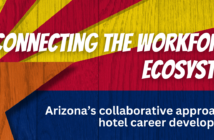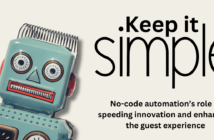Finding the right roads to navigate today’s obstacles
The human brain craves dichotomous thinking – yes or no, black or white, left or right, and so on. But real-world events are always many shades of gray, marked by continuous and complex developments. As this concerns hoteliers, we all want the COVID-19 pandemic to end in absolute terms yesterday, with travel restrictions fully lifted, while occupancies and operations immediately revert to what they were in 2019. If only it were that easy.
As a part of this psychological disposition, around the start of each new cycle, we all think in terms of resolutions, looking for the next big thing to entirely shift our outlooks into an assuredly positive direction. Instead, 2022 presents no clear answers. It will be a time of gradual recovery and the steady growth of industry trends that have already existed or been regularly seeded for some time now.
Working with several prominent hoteliers who have successfully guided their companies through the various entanglements of the past 24 months, what we stress is that this is a year for deepening the synergy of your teams with technology, all in the pursuit of great guest service and even more cost savings. In shorthand, this “teams and tech” approach can be playfully abbreviated into the acronym TNT, which works because, when done right, this mantra is the dynamite you need to blow up any problems of the present or near past.
STARTING WITH POSITIVITY
Much as our minds tend to sort events into binary terms, so too are we fear-based creatures. The news cycle feeds on this, dealing out an endless barrage of negativity to keep you glued to the screen. Despite all the worries and uncertainties as global travel confronts yet another coronavirus variant, it’s critical that you reframe what’s happening with optimism to derive the best possible solution for your organization and come out on top.
Offering some sage words here is Andrew Carey, CEO of Newport Hospitality Group, a Virginia-based management company with properties across the entire Eastern Seaboard that has experienced tremendous growth during the pandemic. “Throughout the history of hospitality, innkeepers have sought ways to improve efficiency while protecting or enhancing the guest experience,” Carey said. “As we progress through the current pandemic and look to solve the ongoing labor issues, I’m confident the industry will find new solutions to address the repetitive manual aspects of hospitality, freeing associates to interact with and help guests.”
To borrow the term coined by renowned economist Nassim Nicholas Taleb, you want your hotel property to have “anti-fragility” – one that gains from disorder – and this starts with a positive attitude. Indeed, as Carey has highlighted, when you consider the current state of the industry on a long timescale, you’ll see COVID-19 is yet one more reason to do more with less and to prepare your company for whatever the future holds.
BALANCING OLD WITH NEW
The pandemic has led to many seemingly permanent shifts in the workplace dynamic. For one, working remotely is now both a widely accepted and much-vaunted incentive, especially for managers with young families where flexibility is a big advantage. Another would be the flattening of the corporate structure as automation and the proliferation of intelligent platforms together mean that your hotel doesn’t need as many supervisors or managers to effectively oversee operations.
Despite all these changes to workflow and productivity, though, we can attest to the perseverance of tried-and-true hospitality as led by the dedicated service delivery of on-site teams. This is something that was clarified by Pere Sanchez Frijole, general manager of the Roger Smith Hotel, an independent, family-owned property in Midtown Manhattan.
“Cost-saving opportunities in management headcount are possible to have more effective teams. The pandemic taught us that non-operations team members don’t need to be on property all the time. Allowing them to be more malleable with their schedules increases their productivity,” Sanchez continued. “What would be a huge mistake is to cut labor in positions where it affects the guest experience and can damage brand reputation. Those facing customers, with opportunities to match or exceed guest expectations, are critical for creating memorable experiences.”
The lesson here is that technology can help digitalize workflows and help increase manager productivity, but you still need a solid backbone of on-site staffers for service delivery. You may think technology can solve all your woes right away, but until the invention of lifelike robots, your frontline team must remain strong. Therefore, a good TNT mindset means balance, and with the labor market challenges at present, the solution may involve the concurrent deployment of new tech with a streamlining of core service offerings as was confirmed by Anil Taneja, managing director of Palm Holdings, a family-owned hospitality ownership and management group.
“Hotels have always been behind airlines and retail when it comes to automation. We tend to adopt last,” Taneja stated. “With the current labor shortages, we quite simply don’t have the choice to take the lead in innovation and pave the way for ourselves and other industries. Service will always be at the forefront. We need to focus on simplifying the entire value chain – pre-stay, during, and post-departure – using automation and tech to enhance the hotel experience without adding more people.”
THE HOLISTIC POTENTIAL FOR TNT
Once you’ve found that balance between teams and tech by both smoothing out the hotel experience so that it matches the capabilities of your on-site teams as well as setting up various systems or platforms to automate any repetitive tasks within that value chain, it’s time to start thinking about how to steadily transform your hotel company into a data company.
The modern hotel tech now has so many parts. Despite the setup costs you likely have incurred thus far to build APIs and push the data across disparate pieces of software, more integrations are needed. The goal is to build a central hub for all accrued information so you can make holistic, data-driven decisions that can impact multiple operations. Matthew Opferkuch, president and co-founder of The Laundry Rooms, an extended-stay hotel brand in Ontario, Canada, that applies elements of home sharing accommodations and short-term rental platforms to meet post-pandemic guest demands, elaborated on how this inevitably benefits a hotel.
“At the Laundry Rooms, we are leveraging technology that prioritizes customer experience to gain loyalty, build resilience, and future-proof our business,” Opferkuch stated. “We believe the way to turn our guests into advocates is by engaging them at every possible opportunity. To that end, we’ve developed a tech stack that allows our guests to plug into our community and engage with us before, during, and after their stay. We take a holistic approach to tech, so not only does technology have a significant positive impact on operating costs, but it also forms an integral part of our marketing.”
In ages past, we had teams to manage guest relations for before, during, and after the stay. Now, we can deploy tech to not only fill in the gaps but also give hoteliers a clearer indication of how to improve promotional efforts without drastic cost increases. By having more information feed into a customer relationship management (CRM) system or, one level deeper, into a customer data platform (CDP), you can more accurately identify your “lookalike customers.” These are consumers who are similar in geography, demographics, or interests when compared to your existing guest profiles and, thus, most likely to book at your hotel.
Outside of marketing and generating reservations from wholly new customers, having a robust CRM or CDP also works in a positive feedback loop to give you more actionable intelligence on what operational improvements would be the most meaningful for guests. In this sense, TNT works to boost total revenue per available room by integrating data that was previously siloed within specific departments.
As an example, imagine how you would prioritize maintenance work, parts orders, and FF&E budgets if you had every review from all third-party travel websites pushed into one platform with sentiment analysis performed to identify the most decisive factors of the guest stay and rank what physical upgrades will best nudge future customers toward giving more positive reviews. Such technology exists today, albeit with some integration requirements.
Where to start in 2022

OLIVIER LE MOAL/SHUTTERSTOCK.COM
There’s a concept in futurist circles that demonstrates where the notion of teams and tech will end up. In artificial intelligence, a centaur denotes the marrying of a speedy computer with a knowledgeable human team where the former does the grunt work while the latter comes up with creative strategies, just like the Greek mythical creature it’s named after – a horse body with a human torso and brain.
But that’s still some time away. In the meantime, let’s summarize what we learned, which you can start applying to your company today:
- Respond positively to any pandemic hiccup, treating each as a way to keep improving.
- Especially in hospitality, teams are indispensable for high-quality service.
- Streamline the guest value chain to balance service delivery with labor shortages.
- Look for technology that can eliminate repetitive tasks to increase per-capita productivity.
- TNT (teams and tech) is a gradual process that will continue during the entire decade ahead.





